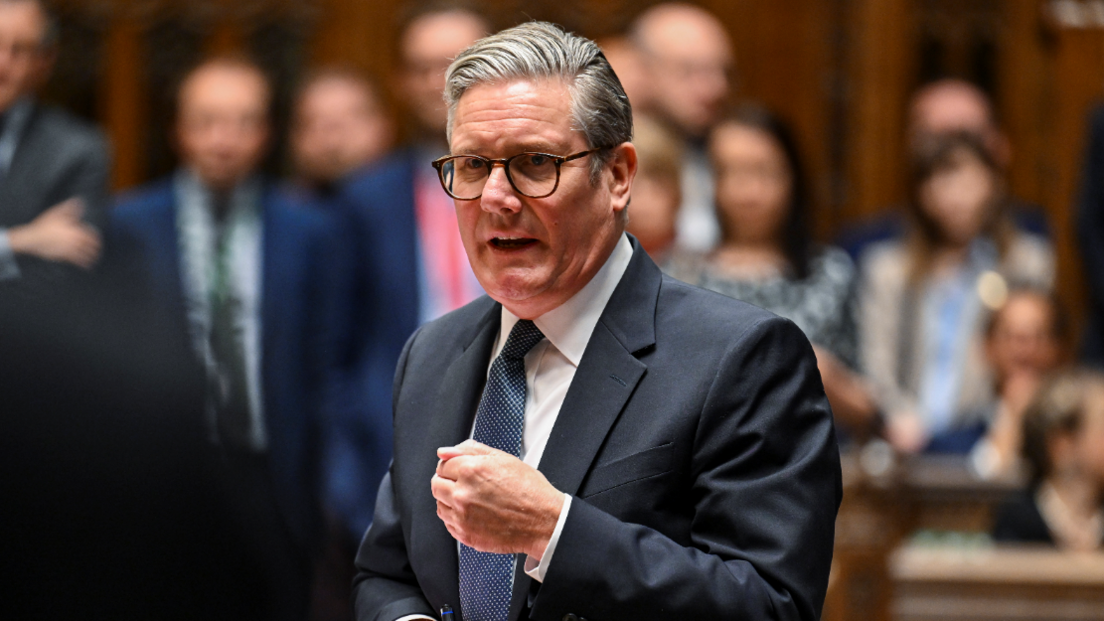Starmer announces U-turn on winter fuel payment cuts

- Published
Sir Keir Starmer has announced plans to ease cuts to winter fuel payments, in a U-turn following mounting political pressure in recent weeks.
More than 10 million pensioners lost out on the payments, worth up to £300, when the pension top-up became means-tested last year.
Speaking at Prime Minister's Questions, Sir Keir said ministers would change the threshold to allow "more pensioners" to qualify again.
But it remains unclear how many will regain their entitlement for the payments, or when the changes will take effect.
Sir Keir said the policy would be changed at the autumn Budget, adding ministers would only "make decisions we can afford".
Starmer's winter fuel U-turn seeks to calm Labour nerves
- Published21 May
How much is the winter fuel payment and who can still get it?
- Published16 September
The winter fuel payment is a lump sum of £200 a year for households with a pensioner under 80, or £300 for households with a pensioner over 80.
It was previously paid in November or December to all pensioners, but 10.3 million lost out last year after the government restricted eligibility to those who qualify for pension credit, external and other income-related benefits, to save an estimated £1.4bn.
The move, announced shortly after Labour took office last July, led to fierce criticism from unions and pensioner charities.
But pressure to change course has grown in recent weeks, with some Labour MPs and councillors blaming the policy for the party's losses at last month's local elections in parts of England.
Grumbling from MPs generally on the Labour left spread into the party more widely, and even MPs who defended the policy said it was the most frequently raised issue by members of the public.
Former Labour prime minister Gordon Brown, who introduced winter fuel as a universal benefit when chancellor, said Sir Keir was "right" to reconsider.
Speaking to the BBC he said: "No pensioner should be forced into poverty, if they have served the country all their lives, if they can not afford heating because they don't have the funds to do so.
"I think what Keir is saying is we will be fair to pensioners."
'Longest U-turn'
It had been thought a change in approach could be confirmed at next month's spending review, when the government will set out departments' budgets for the coming years.
But in a surprise move, Sir Keir confirmed the policy U-turn in response to a Labour backbencher's at Prime Minister's Questions.
Tory leader Kemi Badenoch did not respond immediately to the announcement, waiting until the fourth of her six allotted questions to mention it.
She later denied she had been wrong-footed, telling reporters she "had to talk" about rising inflation figures first, and the order of her questions was "not what people out there care about".
She welcomed the "inevitable" U-turn, but called on the government to set out "early" details of their new approach, adding that autumn's Budget would be too late to deliver changes this winter.
She did not specify where she wanted the new threshold to be set, but added she did not think that "millionaires" should qualify again.
Liberal Democrat leader Sir Ed Davey welcomed the "longest U-turn" from the government, and called for the cuts to be reversed "in full".
Eligibility questions
The income threshold for pension credit, the main benefit to qualify to continue to receive winter fuel payments, is currently £11,800 a year for individuals and £18,023 for pensioner couples.
Designing a new income threshold will now present political and practical headaches for ministers ahead of the Budget in the autumn.
Possible options suggested by commentators and policy experts include linking it to lower council tax bands, or expanding eligibility to those receiving housing or disability benefits.
Resolution Foundation, a think tank, said there were "huge doubts" over creating a new dedicated means test to qualify for the top-up.
It added the most straightforward option would be to expand eligibility for pension credit - but cautioned that expanding this by 10% would cost £2.5bn due to knock-on costs, more than the original policy was meant to save.
Age UK, one of the charities opposing the cuts, welcomed the change in approach but said any new system should ensure pensioners on "low and modest incomes" would be able to keep the payments.
Asked by reporters when the changes would take effect, the prime minister's spokesman declined to guarantee it would be in place this coming winter, but added: "We obviously want to deliver this as quickly as possible.
"We will only make decisions when we can say where the money is coming from, how we're going to pay for it and that it's affordable," he added.
Triple lock
Winter fuel payments, introduced in 1997, were billed as a way to guarantee pensioners would be able to heat their homes during colder months.
From 2010 onwards, the main state pension gained additional protection under the "triple lock" policy - under which pensions go up each year by the highest of inflation, average earnings or 2.5%.
This year state pensions went up by 4.1% - a rise of £363 a year for those on the basic pension or £472 for those on the new pension.
Winter fuel payments are devolved, with the UK government responsible for payments in England and Wales.
The Northern Ireland Executive also scaled back payments last winter following Labour's cuts, but kept a £100 top-up for all pensioners.
The Scottish government also means-tested payments last year, but was planning to introduce a universal £100 payment next winter for those who no longer qualified for the main payment.

Sign up for our Politics Essential newsletter to read top political analysis, gain insight from across the UK and stay up to speed with the big moments. It'll be delivered straight to your inbox every weekday.